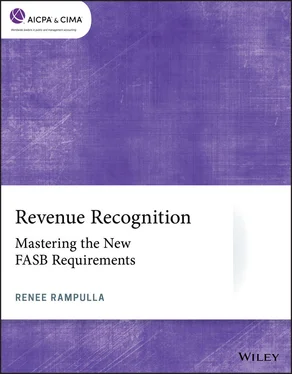Step 2: Identify the performance obligations in the contract
Step 3: Determine the transaction price
Step 4: Allocate the transaction price
Step 5: Recognize revenue when or as the entity satisfies a performance obligation
In this chapter, we will focus primarily on concepts involving step 2, identifying the performance obligations in a contract.
Identifying the performance obligations in the contract
After an entity has determined that it has a contract with a customer, thereby meaning that the criterion in step 1 has been achieved, they will turn their attention to step 2. This is performed by assessing, at the inception of the contract, the types of goods or services, or both, promised in the contract with the customer. The entity will need to determine whether each of these goods or services, or both, meet the definition of a separate performance obligation. Therefore, it is important to understand the definition of a performance obligation, which is given in the FASB Accounting Standards Codification ®(ASC) master glossary as:
Performance Obligation: A promise in a contract with a customer to transfer to the customer either:
1 A good or service (or a bundle of goods or services) that is distinct
2 A series of distinct goods or services that are substantially the same and that have the same pattern of transfer to the customer.
Promised goods and services identified in a contract
Generally, a contract with a customer will explicitly state the promised goods or services; however, promised goods and services need not be explicitly stated. A contract with a customer may also include promises that are implied. These implied promises might have originated by an entity’s customary business practice, published policies, or specific statements if made at the time the customer entered into the contract. Implied promises may create a reasonable expectation that the entity will transfer to the customer a good or a service.
 Key point
Key point
Assessing whether a good or service is a performance obligation does not apply when the promised good or service
is immaterial in the context of the contract with the customer.
does not include the activities that an entity must undertake to fulfill a contract unless those activities transfer a good or service to a customer. For example, administrative tasks to set up a contract. are not promised goods or services in the contract with the customer, and therefore, would not be considered a performance obligation.
Keep in mind that the term “immaterial” is not defined in FASB ASC 606, Revenue from Contracts with Customers; consider referring to FASB ASC 105, Generally Accepted Accounting Principles. FASB ASC 105-10-05-6 explains that the provisions in the FASB ASC need not be applied to immaterial amounts.
A word of caution, although FASB ASC 606-10-25-16A established that immaterial items are not required to be assessed as promised goods or services for purposes of identifying performance obligations, entities should consider the relative significance or importance of a particular promised good or service at the contract level rather than at the financial statement level, considering both the quantitative and the qualitative nature of the promised good or service in the contract. Additionally, FASB ASC 606-10-25-16B clarifies that this approach to materiality does not apply to customer options and related material rights, where specific guidance in paragraphs 41 -45 of FASB ASC 606-10-55 applies.
The following are some types of promised goods or services that may be included in a contract with a customer; keep in mind that the following is not all inclusive:
Sale of goods produced by an entity (for example, inventory of a manufacturer)
Resale of goods purchased by an entity (for example, merchandise of a retailer)
Resale of rights to goods or services purchased by an entity (for example, a ticket resold by an entity acting as a principal)
Performing a contractually agreed-upon task (or tasks) for a customer
Providing a service of standing ready to provide goods or services (for example, unspecified updates to software that are provided on a when-and-if-available basis) or of making goods or services available for a customer to use as and when the customer decides
Providing a service of arranging for another party to transfer goods or services to a customer (for example, acting as an agent of another party)
Granting rights to goods or services to be provided in the future that a customer can resell or provide to its customer (for example, an entity selling a product to a retailer promises to transfer an additional good or service to an individual who purchases the product from the retailer)
Constructing, manufacturing, or developing an asset on behalf of a customer
Granting licenses
Granting options to purchase additional goods or services (when those options provide a customer with a material right)
The term material right is not defined in FASB ASC 606 but is used quite often throughout the illustrative examples in FASB ASC 606. Understanding whether a customer was promised a material right is important because material rights generally give rise to separate performance obligations. Assessing whether an entity has granted a customer a material right might be a bit confusing. To assist in this assessment, an entity will need to consider whether the customer received a promise to acquire an additional good or service they would not have been entitled to had they not entered into the contract. The following are a few examples, although not all inclusive, that might give rise to a material right:
A customer purchasing a good from an entity and upon completion of the transaction receives a coupon or voucher for a percentage off their next purchase.
A customer who is part of an entity’s customer loyalty program purchases a service from an entity, such as airfare, and a certain amount of loyalty points for future use.
 Example 3-1 Determining whether a customer received a material right/separate performance obligation
Example 3-1 Determining whether a customer received a material right/separate performance obligation
The contract with the customer
Arrow Software Company enters into 100 separate contracts with its customers to provide 1 year of database maintenance services for $1,000 per contract. The terms of the contracts specify that at the end of the year, each customer has the option to renew the maintenance contract for a second year by paying an additional $1,000. Customers who renew for a second year also are granted the option to renew for a third year for $1,000. Arrow Software Company charges significantly higher prices for maintenance services to customers that did not initially sign up for the maintenance services. The annual maintenance service would be $3,000 in year 2 and $5,000 in year 3 for customers that did not initially purchase the renewal service or allowed the service to lapse.
Consideration in determining whether a customer received a material right/separate performance obligation
The customers would not have received the renewal options had they not entered into the contracts with Arrow Software Company.
The price for the database maintenance services would be significantly higher in years 2 and 3 without the initial purchase of the renewal service
Conclusion
Arrow Software Company would conclude that the renewal option in its contracts with customers provides a material right that the customers would not receive without entering into the contracts because the price for maintenance services would be significantly higher had those customers not initially elected to purchase the database maintenance services for years 2 and 3. Therefore, Arrow Software Company would conclude that the promise to provide the renewal option is a separate performance obligation.
Читать дальше

 Key point
Key point Example 3-1 Determining whether a customer received a material right/separate performance obligation
Example 3-1 Determining whether a customer received a material right/separate performance obligation










